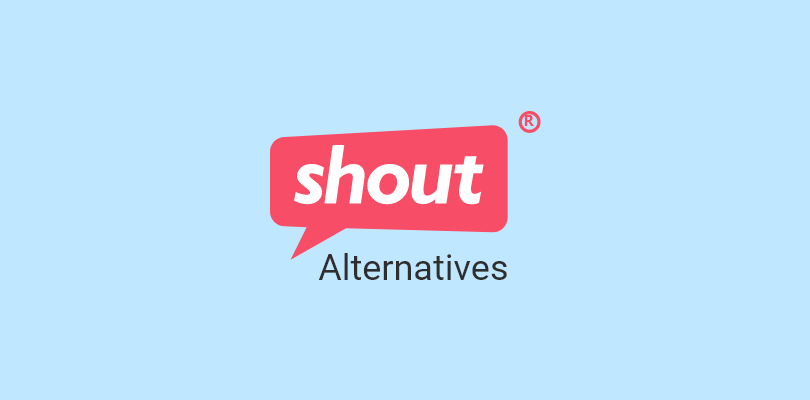According to Voxco, the global online survey software market is expected to grow at a remarkable CAGR of 11.4% by 2028 cementing the importance of data collection and analysis in today’s business landscape.
Since surveys are at the forefront to gather valuable business and customer experience insights, people often use survey tools like QuestionPro for the same.
But over a decade, I’ve come across several QuestionPro alternatives that offer more advanced features and functionalities.
So, here’s a list of QuestionPro alternative tools that can help you get better results.
Let’s see their detailed analysis to find out the best option.
Top 8 QuestionPro Alternatives
This list draws from my firsthand experience in the industry, suggestions of my industry peers, and reviews from credible website sources.
1. Qualaroo – Best for Comprehensive Survey Solutions
Qualaroo is synonymous with comprehensive and advanced online survey solutions, and there’s a reason it ranks first on my list.
It offers several built-in survey templates to customize to collect customer feedback, improve user experience, increase conversion rate, and more. But what caught my attention longer than the other features is its AI-powered sentiment analysis for analyzing the emotions in the responses. You can also visualize this sentiment data using a word cloud.
The platform allows targeting specific website visitors based on various criteria, such as their behavior, location, or referral source. This way, you can show surveys to the right audience at the right time.
Now, that’s what I expect from a QuestionPro survey tool alternative when I need comprehensive survey solutions. Here’s how Qualaroo dashboard looks like:
And it’s not just me. Even some world-class brands like Hootsuite used Qualaroo to get better outcomes.
| “Using Qualaroo we got to hear feedback from our visitors in their voice. We used the data to develop and completely redesign our branded landing page and validate our hypotheses. Qualaroo gave us a 16% lift in conversion at 98% statistical significance.” |
What You Will Like:
- Read-made templates for surveys including NPS (Net Promoter Score), CSAT (Customer Satisfaction), and CES (Customer Effort Score), Exit Intent surveys, etc.
- Feedback widgets to embed surveys directly on your website or app so respondents can take the survey anytime they want.
- In-app surveys for iOS and Android users to capture user feedback in real time without interrupting their experience.
- Nudge for prototypes to get user insights quickly and effortlessly.
- Prompt customer support assistance and self-help options.
- Create surveys in 70+ languages.
- Integrates with other tools like Zapier, Salesforce, Adobe Analytics, and more.
What You May Not Like:
- Free trial lasts only 15 days, which might not be sufficient for some users.
- No option to switch to dark mode.
Price: Starts at $69/month. 15-day free trial available.
Read More: A Comprehensive Guide To User Feedback
2. SurveySparrow – Best for Conversational Surveys

(Source: Pipedrive)
If you want a QuestionPro alternative that allows you to create conversational surveys, go for SurveySparrow.
Its conversational survey design mimics a chat-like interface, making it engaging and easy for respondents to interact with. This approach encourages higher response rates.
The platform makes it easy to set up skip logic and branching paths based on respondents’ answers, creating a more personalized survey experience, and this conditional logic feature makes it effective.
One of the features I really like is its wide range of question types, such as image choice, MCQs, open-ended questions, heat maps, etc. that give more context and color to your data.
Besides, if you wish to make broader conversations, you should know that SurveySparrow allows you to customize everything from buttons to the welcome message in the language of your choice. Sounds cool, doesn’t it?
What You Will Like:
- Create and share mobile-first, conversational surveys that are user-friendly and engaging.
- Offers both a conversational and form-like output, increasing the survey completion rate.
- Voice transcription to transcribe spoken survey responses to text instantly.
- Case management feature that lets you assign tasks, track progress, and build solutions based on the feedback received.
- Offline surveys can be useful for collecting data in areas with poor or no internet connectivity.
What You May Not Like:
- Lacks email marketing features, so there is no way to send reminders and segment audiences.
- Depends highly on developers, which can be time-consuming.
Price: Starts at $19/per month. Billed yearly.
3. Qualtrics – Best for Enterprise Feedback Management (EFM)

When it comes to finding the best survey tools for enterprise feedback management, Qualtrics enjoys a fair share of popularity.
This is one of the best QuestionPro survey tool alternatives that allows you to create a wide range of surveys and feedback forms required by large organizations, including customer satisfaction surveys, employee engagement surveys, market research questionnaires, and more.
And I love its multi-channel data collection approach, allowing me to reach my target audience wherever they are. I was able to collect feedback through multiple channels, including web surveys, email, SMS, mobile apps, and even offline surveys.
The platform presents a wide array of solutions, encompassing market segmentation, brand assessment, voice of the customer initiatives, and employee experience administration.
I also like Qualtrics’ remarkable ExpertReview feature, which assesses multiple inquiries and provides design suggestions to enhance your surveys.
What You Will Like:
- Advanced reporting and analytics tools that help you gain insights from the data you collect.
- Text and sentiment analysis to categorize and analyze open-ended responses and gain deeper insights into customer sentiments.
- Customize the look and feel of your surveys and feedback forms to align with your brand.
- Role-based access control to ensure that the right people can view, analyze, and act on feedback data.
What You May Not Like:
- Takes a lot of time to load reports for large amounts of data.
- Lacks the ability to maintain multiple shared reports that can include or exclude various data cuts.
Price: Custom pricing.
4. SurveyMonkey – Best for Product Feedback Surveys

(Source: G2)
This effective QuestionPro alternative is a handy survey tool that offers expert-certified templates to create surveys that match your product goals and target audience.
For instance, you can use the new product template to get feedback on a product’s design, description, and features before it hits the market.
It also has a global panel feature that allows you to access a diverse pool of respondents worldwide, who can provide valuable market insights for your surveys. You can also target specific demographics, locations, or interests for your panel.
Now, here’s something that I love using.
It has a feature called SurveyMonkey Genius to get instant feedback on your survey design and optimize it for better results. This can help you improve your survey questions, response options, and logic to increase the quality and quantity of your responses.
What You Will Like:
- Skip logic feature to create dynamic surveys where questions are displayed based on respondents’ previous answers.
- Multiple distribution methods, including email invitations, web links, embedded surveys, and social media integration.
- SurveyMonkey Audience that helps to reach millions of respondents who match your ideal customer profile and get feedback from them in minutes.
- Collaborate with team members on survey creation and analysis for collecting and interpreting product feedback.
- Export survey data in various formats (e.g., CSV, Excel) for further analysis, reporting, or sharing.
What You May Not Like:
- Very limited survey customization options for users can choose from.
- The free version only allows you to ask 10 survey questions with 100 results.
Price: Starts at $39/user/month. Free version available with limitations.
5. Typeform – Best for Lead Generation Surveys

(Source: Typeform)
Typeform is an incredible QuestionPro alternative that can easily outrun its competitor with the ability to create engaging and interactive surveys.
It offers features like conditional logic, question branching, and multimedia elements in surveys that can capture respondents’ attention and keep them engaged throughout the survey.
I used Typeform surveys to collect lead data and was able to access it all in my HubSpot account, thanks to its seamless integration.
It lets you include a progress bar in your lead generation survey that encourages respondents to continue and complete the survey, increasing the chances of gathering valuable lead data.
Besides, you can also implement lead scoring within your survey to prioritize and segment leads based on their responses and engagement levels.
After completing the survey, you can direct respondents to a custom thank-you page or message. This can be an opportunity to nurture leads, provide additional resources, or guide them to the next steps.
What You Will Like:
- Upload logos, make color palettes, and build themes that match your brand identity and style.
- Set up notifications to receive an alert when a new lead completes your survey.
- Share your surveys via email and social media platforms, making it easier to reach a wider audience.
- Offers features like data encryption, GDPR compliance tools, and HIPAA compliance for sensitive data.
What You May Not Like:
- Does not have a native offline mode, so you always need an internet connection to use it.
- Not suitable for complex surveys that require advanced logic and branching.
Price: Starts at $25/month.
6. Google Forms – Best for Small Businesses

(Source: MySmartPrice)
Google Forms is an online form builder, part of the Google Workspace ecosystem.
You can call it an effective QuestionPro alternative because it allows you to create surveys, quizzes, polls, and other types of forms for personal or small business use.
Google Forms offers 17 pre-built templates that cover various categories. You can use these templates to create your survey quickly and easily and even customize them.
For example, you can use the customer feedback survey template to collect feedback from your customers about your products or services.
I found its conditional logic feature to be very effective. You can use it to show or hide questions based on the answers to previous questions. This way, you can create a more personalized and relevant survey experience for your respondents.
Google Forms even provides you with automatic summaries of the responses in the form of charts and graphs. You can view the responses in real-time as they come in and get a quick overview of the results and insights from your survey.
What You Will Like:
- Save and organize the survey responses automatically in a Google spreadsheet to access and analyze anytime.
- Set validation rules to ensure that respondents enter the correct type of data, reducing errors in data collection.
- Collect anonymous responses to encourage honest feedback, especially in sensitive or employee-related surveys.
- Generate charts and graphs to visualize and understand the survey results easily.
- Allows unlimited responses, which is useful for businesses of any size, especially as they grow.
What You May Not Like:
- Lacks comprehensive survey templates.
- Highly limited customization options.
Price: Starts at $6/month. Free individual plan available.
7. Alchemer – Best for Employee Feedback Survey

Popular as SurveyGizmo in the past, Alchemer is a decent QuestionPro alternative in my experience for several reasons.
Firstly, Alchemer offers as many as 43 question types. This flexibility enables you to tailor your surveys to gather specific employee feedback.
Secondly, it includes more than 20 logic and branching options, including Question Piping, Auto-complete Text Responses, Skip Logic, Soft-require Questions, and Custom Scripting.
This means the employees will only see the questions that are relevant to them, ensuring a concise and engaging survey experience.
My favorite feature of the tool is Alchemer Workflow, which is the fastest, easiest, and most effective way to interact with the employees who give feedback so organizations can increase retention, adoption, growth, and advocacy.
It even enables you to automate actions based on feedback data, such as sending emails, creating tickets, updating records, and more.
What You Will Like:
- Run short surveys to gather ongoing feedback in order to gain insights, track goals, and get a sense of the overall pulse.
- Pre-designed survey templates and the ability to create custom themes.
- Distribute surveys via email, web links, social media, or even embed them on your company website.
- Supports anonymous surveys, which can encourage more candid feedback.
- Supports advanced features such as conjoint analysis, video dial-testing, image heat maps, and timed questions.
What You May Not Like:
- The free plan is very restricted and offers only 3 surveys, 100 responses, and 10 questions per survey.
- Some advanced features require Javascript coding, which can be challenging for non-technical users.
Price: Starts at $25/month.
8. Sogolytics – Best for Detailed Data Reports

(Source: TrustRadius)
So SoGoSurvey is now Sogolytics, and it’s not just the name that has seen a makeover. In fact, this QuestionPro alternative has improved much in terms of data reports and analytics, offering various features for creating and managing customer and employee experiences, such as surveys, polls, quizzes, and forms.
The platform allows users to compare data across different time periods, segments, or groups to identify patterns and trends. Users can also create custom reports with filters, cross-tabs, and pivot tables to analyze data in depth.
And do you know what I found extremely exciting? Its ability to create customizable reports. It allows you to create customizable reports, which means you can tailor the report format to suit your specific needs. You can choose which data points to include, how to display them, and which visualizations to use.
It even offers options for displaying data in a visually appealing way, such as charts, graphs, dashboards, word clouds, and more. Users can also customize the appearance and layout of their reports to suit their preferences and branding.
What You Will Like:
- A cross-tabulation feature to explore the relationships between different survey questions and responses.
- Export survey data and reports in various formats, including PDF, Excel, and CSV.
- Offers benchmarking features to compare your survey data to industry or global benchmarks.
- Collaborate with team members by sharing reports and data with them.
- Advanced analytics and reporting features, such as predictive analytics, sentiment analysis, and text analytics.
What You May Not Like:
- Limited customization options, especially when creating highly branded and tailored surveys.
- Lacks certain specialized question formats or advanced logic features.
Price: Starts at $25 USD/month. Billed annually.
Ready to Pick the Best QuestionPro Alternative?
So, there you have it.
These are some of the best options competing with QuestionPro pricing and features.
But which one of these has the best features? If this sounds confusing, let me help you. I have shortlisted three tools from the above list:
Option A: Qualaroo
Qualaroo stands out as a top survey solution due to its versatile features. It provides pre-made survey templates for gathering customer feedback, sentiment analysis for qualitative insights, and advanced targeting to target specific website visitors. It also supports various survey types like NPS and CSAT.
Option B: Qualtrics
Qualtrics is a popular survey tool that offers various survey and feedback forms, including customer satisfaction and employee engagement surveys, which are perfect for large organizations wanting to collect diverse feedback.
What’s highly impressive is its multi-channel data collection approach, which allows you to gather feedback through various channels.
Option C: Alchemer
Alchemer is a robust QuestionPro alternative for small and mid-sized businesses. It offers a remarkable 43 question types, enabling tailored surveys for specific employee feedback.
With over 20 logic and branching options, like Skip Logic and Custom Scripting, it ensures a focused and engaging survey experience.
Which one of these QuestionPro survey tool alternatives is the best?
I think Qualaroo has the best features to be the top QuestionPro alternative. I personally like its professionally designed survey templates and the AI sentiment analysis features. Besides, it offers exit-intent surveys and integrates seamlessly with various third-party tools to help close the feedback loop.
Frequently Asked questions
What are the restrictions of QuestionPro?
The restrictions of QuestionPro's free plan include limitations on the number of questions, responses, and advanced features. In the free version, you'll likely encounter restrictions on the number of questions you can include in a survey and the number of responses you can collect, and you may not have access to advanced features like custom branding, in-depth reporting options, or certain question types. These limitations make the free plan suitable for basic survey needs but may not be sufficient for more extensive or advanced research projects.
FREE. All Features. FOREVER!
Try our Forever FREE account with all premium features!







